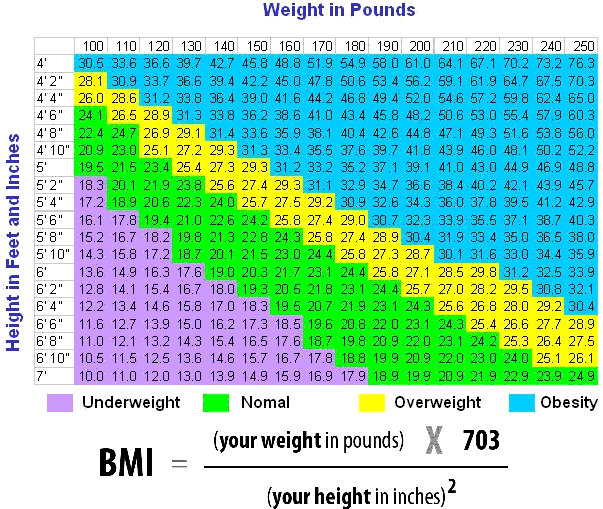While pilots are not currently tested nor disqualified for obesity, Aviation Medical Examiners routinely look for medical conditions caused by obesity and which are disqualifying for pilots and air traffic control specialists.
Measuring ideal weight is not an exact science but formulas such as the Body Mass Index (found below) provides a good indication of body weight and physical proportions. Maintaining ideal body weight is a matter of caloric balance. To lose weight one must expend more calories than is consumed.
To gain weight excess consumption of sufficient calories is all that is required.
Aviation Medical Examiners likely have or will increase their interest in pilot applicants who have elevated BMI values or who may exhibit signs or symptoms of conditions which may be related to obesity such as a sleep disorder.
Weight Loss Medications are typically not accepted by the FAA for pilot use. Maintaining ideal weight is best achieved with diet and activity combined; increasing activity while decreasing food intake. Maintaining your ideal weight reduces the risk for many diseases and may prevent premature death.
While the FAA approves very few weight loss medications, there are some herbal preparations which can be effective, yet these often have undesirable side effects.
![]() Increasing Activity
Increasing Activity ![]() Improving Fitness
Improving Fitness ![]() Strength to Weight Ratio
Strength to Weight Ratio
HOW DO I DETERMINE MY IDEAL WEIGHT?
(1) Measure your waist circumference. Excessive body fat in your waist area increases your risk for many health problems. The waist circumference should be measured just above the navel. A high-risk waistline is defined as more than 35 inches (88 cm) for women, and more than 40 inches (102 cm) for men.
(2) Calculate your Body Mass Index (BMI). The body mass index is a formula to assess a person’s body weight relative to height. It’s a useful, indirect measure of body composition because it correlates highly with body fat in most people. Weight in kilograms is divided by height in meters squared (kg/m2). In studies by the National Center for Health Statistics,
- BMI values less than 18.5 are considered underweight.
- BMI values from 18.5 to 24.9 are healthy.
- Overweight is defined as a body mass index of 25.0 to less than 30.0. A BMI of approximately 25 kg/m2 corresponds to about 10 percent over ideal body weight. People with BMI’s in this range have a moderate risk of heart and blood vessel disease.
- Obesity is defined as a BMI of 30.0 or greater (based on criteria of the World Health Organization), or about 30 pounds overweight. People with BMI’s of 30 or more are at high risk of cardiovascular disease.
- Extreme obesity is defined as a BMI of 40 or greater.
Most highly fit people have a high BMI score but very little body fat. For them the waist circumference, the skin-fold or fat-fold measurements, or more direct methods of measuring body fat may be more useful measures.
Ideal Body Weight – CALCULATING YOUR Body Mass Index

Maintaining your ideal weight is usually a matter of eating an optimal diet and being physically active.



